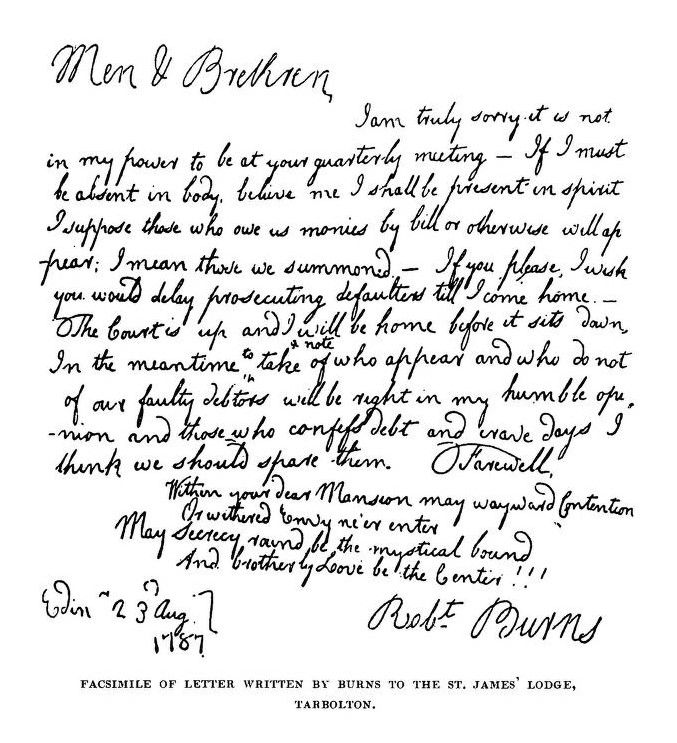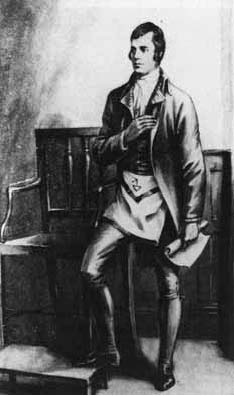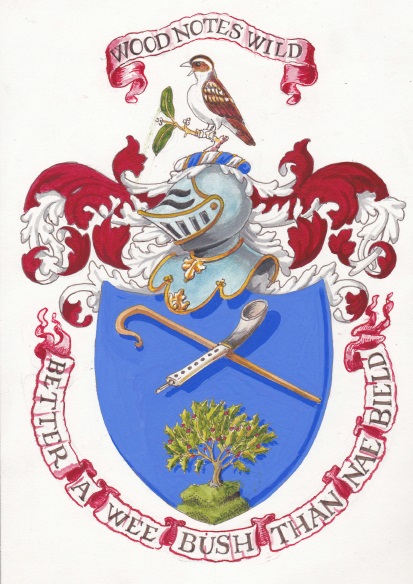The Masonic Poems of Bro. Robert Burns
The Masonic Poems of Bro. Robert Burns

Masonic Song: Ye Sons of Old Killie
Tune: Shawnboy
First printed by Cunningham 1834
Apparently sung by Burns in the Kilmarnock Kilwinning Lodge in 1786, whose W.M. was William Parker, the 'Willie' in line one.
Ye sons of Auld Killie, assembled by Willie,
To follow the noble vocation;
Your thrifty old mother has scarce such another
To sit in that honoured station.
I’ve little to say, but only to pray,
As praying’s the ton of your fashion;
A prayer from the muse you well may excuse,
`Tis seldom her favorite passion.
Ye powers who preside o’er the wind and the tide,
Who marked each element’s border,
Who formed this frame with beneficent aim
Whose sovereign statute is order,
Within this dear mansion may wayward contention,
Or withered Envy ne’er enter,
May secrecy round be the mystical bound
And brotherly love be the center.
To Dr John MacKenzie of Mauchline
An Invitation to a Masonic Gathering
First printed by Motherwell and Hogg in 1834
Friday first’s the day appointed
By the Right Worshipful anointed,
To hold our Grand Procession;
To get a blade o’ Johnie’s morals,
An’ taste a swatch o’ Manson’s barrels,
I’ th’ way of our profession.
Our Master and the Brotherhood
Wad a’ be glad to see you;
For me, I wad be mair than proud
To share the mercies wi’ you.
If Death then wi’ skaith then,
Some mortal heart is hechtin,
Inform him, an’ storm him,
That Saturday ye’ll fecht him.
Robert Burns. Mossgiel, 14th June, A.M. 5790.

Address to the Deil
First printed in the Kilmarnock edition in 1786.
O Thou, whatever title suit thee!
Auld Hornie, Satan, Nick, or Clootie,
Wha in yon cavern grim an’ sooty
Clos’d under hatches,
Spairges [splashes] about the brunstane cootie [brimstone dish],
To scaud [scald] poor wretches!
Hear me, auld Hangie [old hangman], for a wee [while],
An’ let poor, damned bodies bee;
I’m sure sma’ pleasure it can gie,
Ev’n to a deil,
To skelp an’ scaud poor dogs like me,
An’ hear us squeel!
Great is thy pow’r, an’ great thy fame;
Far ken’d [known], an’ noted is thy name;
An’ tho’ yon lowan heugh’s [moaning hollow] thy hame [home],
Thou travels far;
An’ faith! thou’s neither lag nor lame,
Nor blate [bashful] nor scaur [afraid].
Whyles [sometimes], ranging like a roaring lion,
For prey, a’ holes an’ corners tryin;
Whyles, on the strong-win’d Tempest flyin,
Tirlan [stripping/attacking] the kirks;
Whyles, in the human bosom pryin,
Unseen thou lurks.
I’ve heard my rev’rend Graunie [grannie] say,
In lanely [lonely] glens ye like to stray;
Or where auld, ruin’d castles, gray,
Nod to the moon,
Ye fright the nightly wand’rer’s way,
Wi’ eldritch croon [unearthly eerie moan].
When twilight did my Graunie summon,
To say her pray’rs, douse [sober], honest woman,
Aft ’yont the dyke she’s heard you bumman [beyond],
Wi’ eerie drone;
Or, rustling, thro’ the boorties [alder trees] coman [coming],
Wi’ heavy groan.
Ae dreary, windy, winter night,
The stars shot down wi’ sklentan [slanting] light,
Wi’ you, mysel, I gat a fright
Ayont [beyond] the lough [loch];
Ye, like a rash-buss [bunch of rushes], stood in sight,
Wi’ waving sugh [moan]:
The cudgel in my nieve [fist] did shake,
Each bristl’d hair stood like a stake,
When wi’ an eldritch, stoor, quaick, quaick [unearthly harsh, duck quack],
Amang the springs,
Awa [away] ye squatter’d like a drake,
On whistling wings.
Let Warlocks grim, an’ wither’d Hags,
Tell, how wi’ you, an ragweed nags,
They skim the muirs an’ dizzy crags,
Wi’ wicked speed;
And in kirk-yards renew their leagues,
Owre [over] howcket dead [those raised from the dead].
Thence, countra [country] wives, wi’ toil an’ pain,
May plunge an’ plunge the kirn in vain;
For Och! the yellow treasure’s taen,
By witching skill;
An’ dawtit [petted], twal-pint [12 pint] Hawkie’s [cow] gane [gone],
As yell’s the Bill [bull].
Thence, mystic knots mak great absue,
On Young-Guidman, fond, keen an’ croose [over confident];
When the best warklum [work-tool] i’ the house,
By cantraip [magic] wit,
Is instant made no worth a louse,
Just at the bit.
When thowes [thawes] dissove the snawy hoord [snowy hoard],
An’ float the jinglan icy boord [waters surface],
Then, Water-kelpies haunt the foord,
By your direction,
An’ nighted Trav’llers are allur’d
To their destruction.
An ’aft your moss-traversing Spunkies [demons]
Decoy the wight that late an’ drunk is;
The bleezan, curst, mischievous monkies
Delude his eyes,
Till in some miry slough he sunk is,
Ne’er mair [more] to rise.
When Masons’ mystic word an’ grip,
In storms an’ tempests raise you up,
Some cock, or cat, your rage maun stop,
Or, strange to tell!
The youngest Brother ye wad whip
Aff straught to Hell.
Lang syne [long ago] in Eden’s bonie yard,
When youthfu’ lovers first were pair’d,
An’ all the Soul of Love they shar’d,
The raptur’d hour,
Sweet on the fragrant, flow’ry swaird [grassy edge],
In shady bow’r:
Then you, ye auld, snick-drawing dog!
Ye cam to Paradise incog,
An’ play’d on a man a cursed brogue,
(Black be your fa’!)
An’ gied the infant warld a shog [shake],
’Maist ruin’d a’.
D’ye mind that day, when in a bizz,
Wi’ reeket duds [clothes], an’ reestet gizz [scorched wig],
Ye did present your smoutie phiz [smutty face]
’Mang better folk,
An’ sklented [squinted] on the man of Uzz
Your spitefu’ joke?
An’ how ye gat him i’ your thrall [spell],
An’ brak [broke] him out o’ house an’ hal’.
While scabs an’ botches did him gall,
Wi’ bitter claw,
An’ lows’d his ill-tongu’d, wicked Scawl [scold wife]
Was warst ava?
But a’ your doings to rehearse,
Your wily snares an’ fechtin [fighting] fierce,
Sin’ that day Michael did you pierce,
Down to this time,
Wad ding [would beat] a’ Lallan [Lowland Scots] tongue, or Erse [Irish],
In Prose or Rhyme.
An’ now, auld Cloots, I ken ye’re thinkan,
A certain Bardie’s rantin, drinkin,
Some luckless hour will send him linkan [hurrying],
To your black pit;
But faith! he’ll turn a corner jinkan [dodging],
An’ cheat you yet.
But fare you weel, auld Nickie-ben!
O wad ye tak a thought an’ men’!
Ye aiblins [perhaps] might—I dinna ken—
Still hae a stake—
I’m wae to think upo’ yon den,
Ev’n for your sake.
The Farewell to the Brethren of St James’s Lodge, Tarbolton.
First printed in the Kilmarnock edition 1786
Adieu, a heart warm, fond adieu,
Dear brothers of the mystic tie!
Ye favored, ye enlightened few,
Companions of my social joy!
Tho’ I to foreign lands must hie,
Pursuing fortune’s sliddery ba’,–
With melting heart and brimful eye,
I’ll mind you still, though far awa’.
Oft have I met your social band,
An’ spent the cheerful, festive night;
Oft, honored with supreme command,
Presided o’er the sons of light;
And by that Hieroglyphic bright,
Which none but Craftsmen ever saw,
Strong memory on my heart shall write
Those happy scenes, when far awa’.
May freedom, harmony and love
Unite you in the grand design,
Beneath th’ omniscient Eye above,
The glorious Architect divine;–
That you may keep the unerring line,
Still guided by the plummet’s law,
Till order bright completely shine,
Shall be my prayer when far awa’.
And you farewell, whose merits claim
Justly that highest badge to wear,–
Heaven bless your honored, noble name,
To Masonry and Scotia dear!
A last request, permit me here;
When yearly ye assemble a’,
One round,–I ask it with a tear
To him the Bard that’s far awa.
No Churchman am I
The final song of the Edinburgh edition 1787
Tune: Prepare, my dear Brethren, to the tavern let’s fly.
No churchman am I for to rail and to write,
No Statesman nor Soldier to plot or to fight,
No sly Man of business contriving a snare,
For a big-belly’d bottle’s the whole of my care.
The Peer I don’t envy, I give him his bow;
I scorn not the Peasant, tho’ ever so low;
But a club of good fellows, like those that are here,
And a bottle like this, are my glory and care.
Here passes the Squire on his brother – his horse;
There Centum per Centum, the Cit with his purse;
But see you the Crown how it waves in the air,
There a big-belly’d bottle still eases my care.
The wife of my bosom, alas! she did die;
For sweet consolation to church I did fly;
I found that old Solomon proved it fair,
That a big-belly’d bottle’s a cure for all care.
I once was persuaded a venture to make;
A letter inform’d me that all was to wreck;
But the pursy old landlord just waddl’d up stairs,
With a glorious bottle that ended my cares.
‘Life’s cares they are comforts’ – a maxim laid down
By the Bard, what d’ye call him, that wore the black gown;
And faith I agree with th’ old prig to a hair;
For a big-belly’d bottle’s a heav’n of care.
A Stanza Added In A Masonic Lodge:
Then fill up a bumper and make it o’erflow,
And honours masonic prepare for to throw;
May ev’ry true Brother of th’ Compass and Square
Have a big-belly’d bottle when harass’d with care.

Tam Samson's Elegy
First published in the Edinburgh edition 1787
Has auld Kilmarnock seen the Deil?
Or great Mackinlay thrawn his heel?
Or Robertson again grown weel,
To preach an’ read?
“Na, waur than a’! cries ilka chiel,
“Tam Samson’s dead!”
Kilmarnock lang may grunt an’ grane,
An’ sigh, an’ sab, an’ greet her lane,
An’ cleed her bairns, man, wife, an’ wean,
In mourning weed;
To Death she’s dearly pay’d the kane,
Tam Samson’s dead!
The Brethren, o’ the mystic level
May hing their head in woefu’ bevel,
While by their nose the tears will revel,
Like ony bead;
Death’s gien the Lodge an unco devel;
Tam Samson’s dead!
When Winter muffles up his cloak,
And binds the mire like a rock;
When to the loughs the Curlers flock,
Wi’ gleesome speed,
Wha will they station at the cock?
Tam Samson’s dead!
He was the king o’ a’ the Core,
To guard, or draw, or wick a bore,
Or up the rink like Jehu roar,
In time o’ need;
But now he lags on Death’s hog-score
Tam Samson’s dead!
Now safe the stately Sawmont sail,
And Trouts bedropp’d wi’ crimson hail,
And Eels, weel kend for souple tail,
And Geds for greed,
Since, dark in Death’s fish-creel, we wail
Tam Samson’s dead!
Rejoice, ye birring Paitricks a’;
Ye cootie Moorcocks, crousely craw;
Ye Maukins, cock your fud fu’ braw
Withoutten dread;
Your mortal Fae is now awa;
Tam Samson’s dead!
That woefu’ morn be ever mourn’d,
Saw him in shooting graith adorn’d,
While pointers round impatient burn’d,
Frae couples free’d;
But och! he gaed and ne’er return’d!
Tam Samson’s dead!
In vain Auld age his body batters,
In vain the Gout his ancles fetters,
In vain the burns cam down like waters,
An acre braid!
Now ev’ry auld wife, greetin, clatters
“Tam Samson’s dead!”
Owre mony a weary hag he limpit,
An’ aye the tither shot he thumpit,
Till coward Death behind him jumpit,
Wi’ deadly feid;
Now he proclaims wi’ tout o’ trumpet,
“Tam Samson’s dead!”
When at his heart he felt the dagger,
He reel’d his wonted bottle-swagger,
But yet he drew the mortal trigger,
Wi’ weel-aimed heed;
“Lord, five!” he cry’d, an’ owre did stagger –
Tam Samson’s dead!
Ilk hoary Hunter mourn’d a brither;
Ilk Sportsman youth bemoan’d a father;
Yon auld gray stane, amang the heather,
Marks out his head;
Whare Burns has wrote, in rhyming blether,
“Tam Samson’s dead!”
There, low he lies, in lasting rest;
Perhaps upon his mould’ring breast
Some spitefu’ muirfowl bigs her nest
To hatch an’ breed:
Alas! nae mair he’ll them molest!
Tam Samson’s dead!
When August winds the heather wave,
And sportsmen wander by yon grave,
Three volleys let his memory crave,
O’ pouther an’ lead,
Till Echo answer frae her cave,
“Tam Samson’s dead!”
Heav’n rest his saul whare’er he be!
Is th’ wish o’ mony mae than me:
He had twa fauts, or maybe three,
Yet what remead?
Ae social, honest man want we:
Tam Samson’s dead!
The Epitaph
Tam Samson’s weel-worn clay here lies
Ye canting zealots, spare him!
If honest worth in Heaven rise,
Ye’ll mend or ye win near him.
Per Contra
Go, Fame, an’ canter like a filly
Thro’ a’ the streets an’ neuks o’ Killie;
Tell ev’ry social honest billie
To cease his grievin’;
For, yet unskaithed by Death’s gleg gullie.
Tam Samson’s leevin’!
Robert Burns the Freemason, Edited by John Weir.
Robert Burns and freemasonry, by Dudley Wright
Robert Burns as a Freemason, by Bro. William Harvey
Robert Burns in Stirlingshire, by Bro. William Harvey
Robert Burns and Freemasonry – (calgaryburnsclub.com)
Robert Burns, poet-laureate of Lodge Canongate Kilwinning (1893). By Bro. Wallace Bruce
Robert Burns, poet-laureate of Lodge Canongate Kilwinning; facts substantiating his election and inauguration on 1st March 1787, gleaned from the Lodge records and other authentic sources (1894). By Brothers Hugh Peacock and Allan MacKenzie.
History of the Lodge Canongate Kilwinning, No. 2. Compiled from the records, 1677-1888. By Brother Allan MacKenzie. Edinburgh 1888.
Lodge Canongate Kilwinning 2 | Edinburgh (lck2.co.uk)
Lodge Tarbolton (Kilwinning) St James No 135 (thefreemasons.org.uk) – The Lodge of Robert Burns.
A Winter with Robert Burns – The Grand Lodge of Scotland (grandlodgescotland.com)
Burns Pride & Passion CD – The Grand Lodge of Scotland (grandlodgescotland.com)
Sketch of the history of the Knights Templars, by the Chevalier James Burnes K.H.
Notes on his name and family, by the Chevalier James Burnes K.H.
Genealogical memoirs of the family of Robert Burns, and Scottish house of Burnes, by Charles Rogers
